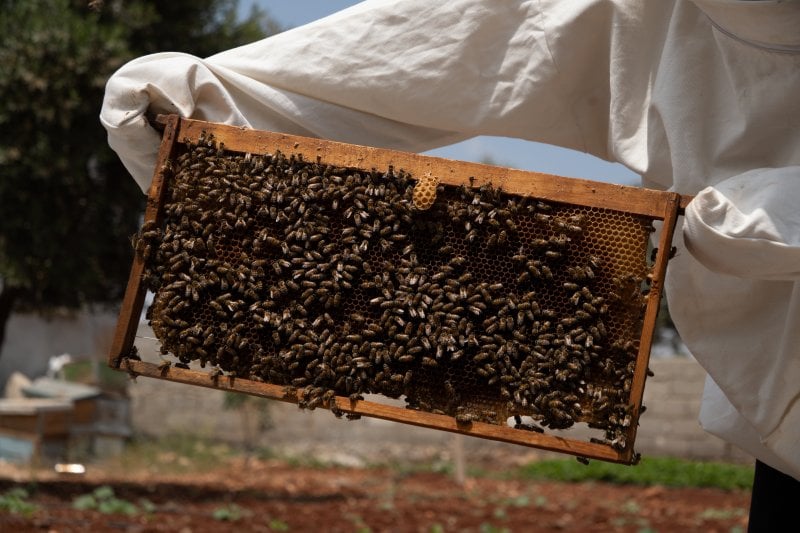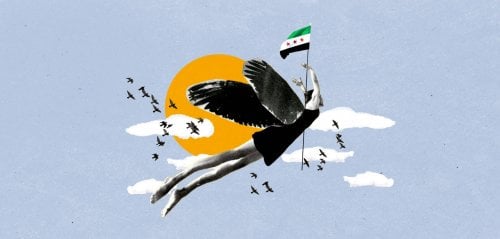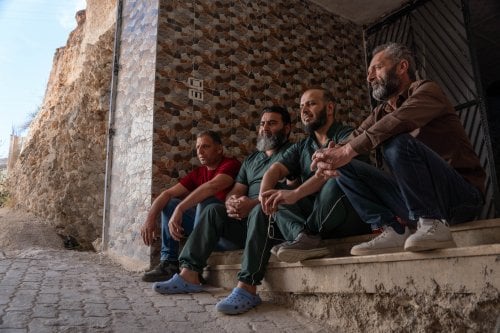Omar Mostafo Jilo stepped out of the car and onto a hill in the vast mountains of Idlib, Syria. He walked towards a row of wooden boxes lined next to each other, a steady buzzing getting louder the closer he got. He opened one of the crates, and picked up a small wooden frame teeming with buzzing bees.
Omar is one of hundreds of beekeepers in Syria, a tradition with a long history in the Arab world.
Omar Mostafa Jilo has been beekeeping for 25 years now. The secretary of Idlib’s beekeeping society explains how he started out with 10 boxes of bees, and over the years, grew his farm to 100 boxes. In the war, that number was reduced to 50. He said that some of the reasons for this include the disappearance of grazing lands in the war and the use of harmful pesticides by farmers due to their cheaper prices.
In the 14-year-long Syrian civil war, thousands of civilians were forced out of their homes to flee to other parts of their country, upending lives and livelihoods entirely.
The age-old beekeeping profession didn’t escape the ravages of the war, but with the blitz overthrow of the Assad regime in December 2024, beekeepers are now dreaming of reviving their beloved trade.Yet, years of war and economic hardship have compounded the difficulty of this endeavor.
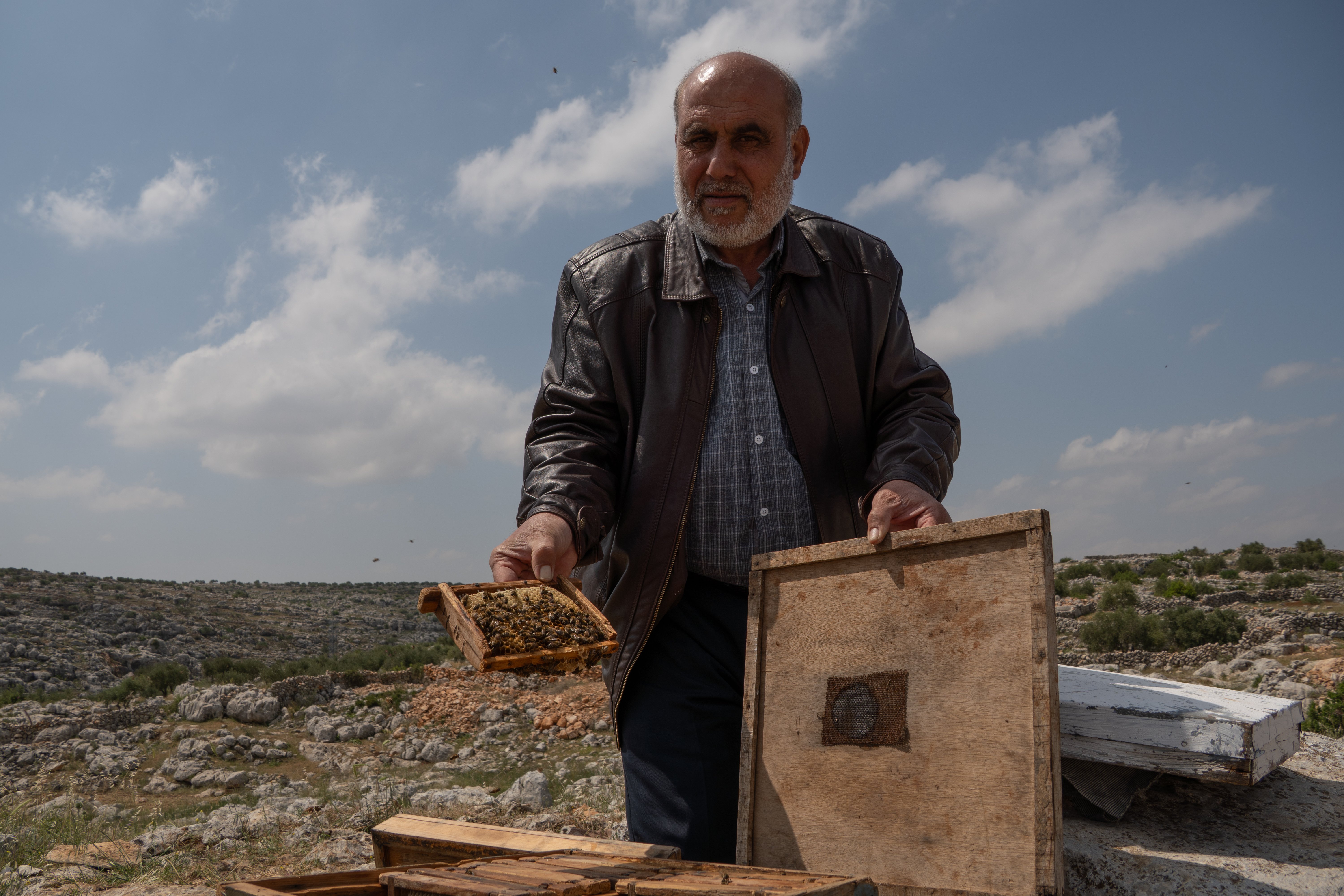 Omar Mostafa Jilo holds up a frame from the box for the bees. April 29, 2025. (Anagha Subhash Nair/Raseef22)
Omar Mostafa Jilo holds up a frame from the box for the bees. April 29, 2025. (Anagha Subhash Nair/Raseef22)
Omar Mostafa Jilo holds up a frame from the box for the bees. April 29, 2025. (Anagha Subhash Nair/Raseef22)
Omar has been beekeeping for 25 years now. The secretary of Idlib’s beekeeping society explains how he started out with 10 boxes of bees, and over the years, grew his farm to 100 boxes. In the war, that number was reduced to 50. He said that some of the reasons for this include the disappearance of grazing lands in the war and the use of harmful pesticides by farmers due to their cheaper prices.
“There was no mobility because of the war, and that is a big deal for the bees,” he adds.
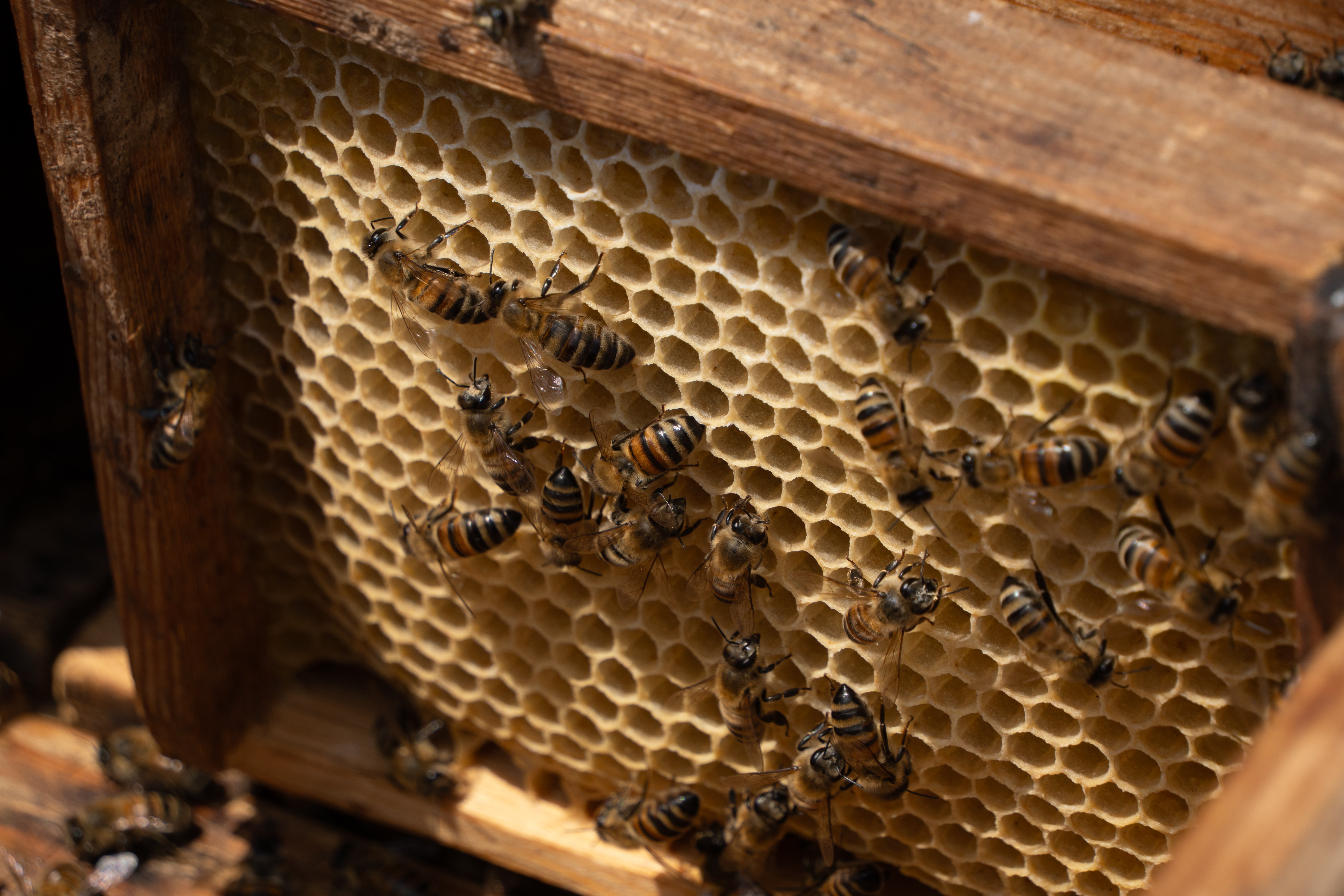 Bees teeming in Omar's hive. April 29, 2025. (Anagha Subhash Nair/Raseef22)
Bees teeming in Omar's hive. April 29, 2025. (Anagha Subhash Nair/Raseef22)
Bees teeming in Omar's hive. April 29, 2025. (Anagha Subhash Nair/Raseef22)
As Omar spoke, his relative, Mostafa Jilo, watched on. Mostafa used to be a beekeeper himself, but was forced to give up his work during the war. He walked into a shed next to his home in Idlib’s Ras al-Husn, and brought down frames used in bee farming, placed atop a pile of abandoned boxes. He explained that a lot of his bees died because he couldn’t take them to other governorates to vary the type of nectar they consumed.
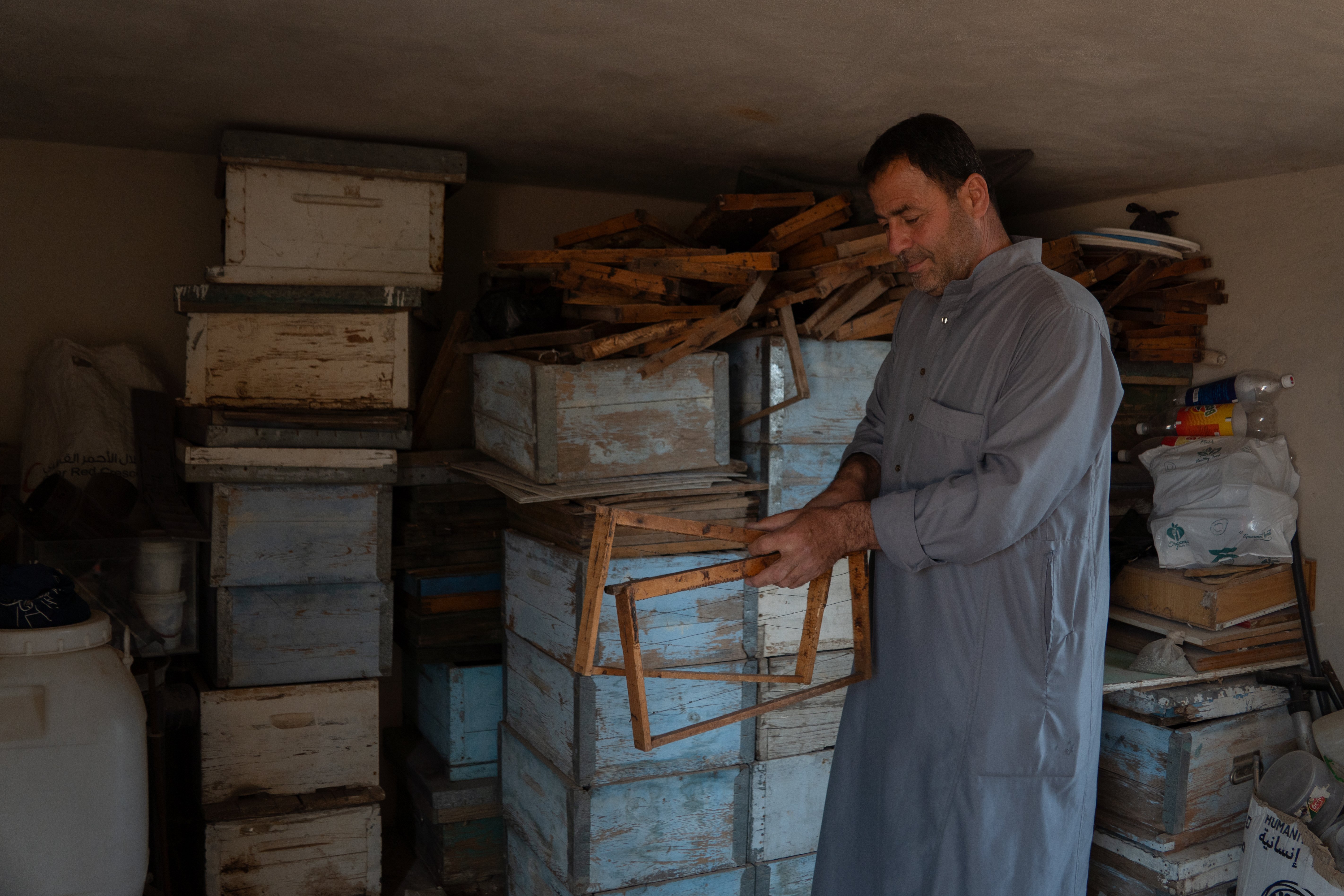 Mostafa Jilo holds frames up from boxes that he used to keep bees in April 29, 2025. (Anagha Subhash Nair/Raseef22)
Mostafa Jilo holds frames up from boxes that he used to keep bees in April 29, 2025. (Anagha Subhash Nair/Raseef22)
Mostafa Jilo holds frames up from boxes that he used to keep bees in April 29, 2025. (Anagha Subhash Nair/Raseef22)
“I’m angry that I don’t have bees anymore,” he said. “My wife keeps telling me to sell off the boxes but I refuse.”
Omar explained that before the war, there were 1,600 beekeepers in Idlib governorate alone. About 500 of them don’t have bees anymore.
“Many families made a livelihood from bees. And now many of them have nothing left except empty boxes,” he said, as Mostafa nodded.
“If someone sick came to me, I’d give some honey which is nature’s healing. Bees are a kingdom in themselves, they live like humans, with queens, soldiers…It’s another world.”
Further south in Batabo, Musal Ghraibi sat in a family farm. As he spoke, a mother hen and her chicks were pecking away in front of him, and to his right were rams that the family herded. His bee boxes were in the backyard, next to the vegetable garden.
“I started with one hive, then they increased to 80,” he said.
[PHOTO]
Originally from south Idlib, he brought his bees with him when he was displaced to Batabo. Ghraibi explained how he lost 50 of his 80 boxes, costing about 2,000 U.S. dollars, in airstrikes or under explosives from war. Ghraibi said that though the situation has improved now, he lacks the funds to buy more bees and improve his yield. In the past, he would do charity with the honey that his bees produced.,
“If someone sick came to me, I’d give some honey which is nature’s healing,” he said. His eyes lit up when talking about his profession. “Bees are a kingdom in themselves,” he said, smiling. “They live like humans, with queens, soldiers…It’s another world.”
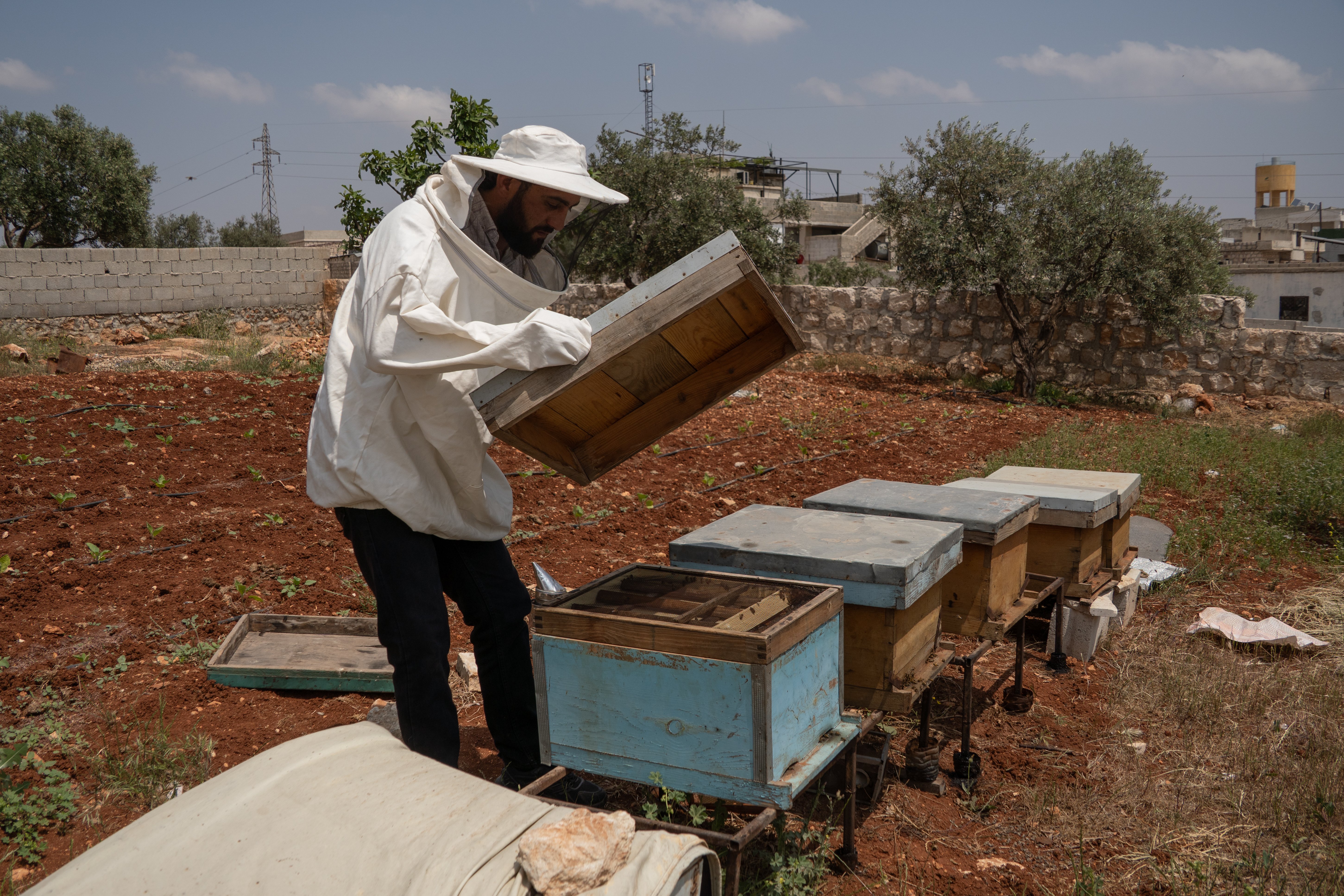 Musal Ghraibi opens one of his boxes with bees April 29, 2025. (Anagha Subhash Nair/Raseef22)
Musal Ghraibi opens one of his boxes with bees April 29, 2025. (Anagha Subhash Nair/Raseef22)
Musal Ghraibi opens one of his boxes with bees April 29, 2025. (Anagha Subhash Nair/Raseef22)
Omar said that increased mobility following the fall of the regime is helping revive the profession, but over 60% of beekeepers are in dire need of governmental support. A wooden box in itself costs 20 U.S. dollars.
“Just to buy 10 empty boxes, [the beekeeper] needs $400. Plus, with the extra cost of the bees, the beekeepers starting anew need help,” he said. “Then hopefully after 2 or 3 years they will become like before again.”
Omar also emphasized the need for a holistic approach where farmers were given funds to buy less harmful varieties of pesticides, which would be “best friends with the bees.” He mentioned there was “coordination” between beekeepers and the Ministry of Agriculture, wherein they would spray pesticides at night to mitigate the damage.
He urged that bees, especially queens, had to be reared in special centers so that they could breed and be distributed to beekeepers, letting them stay in the profession. In his eyes, bees, producing honey with its healing effects, are an insect that are close to God. He referenced the Arabic expression ‘active like a bee,’ used to describe people with a good work ethic.
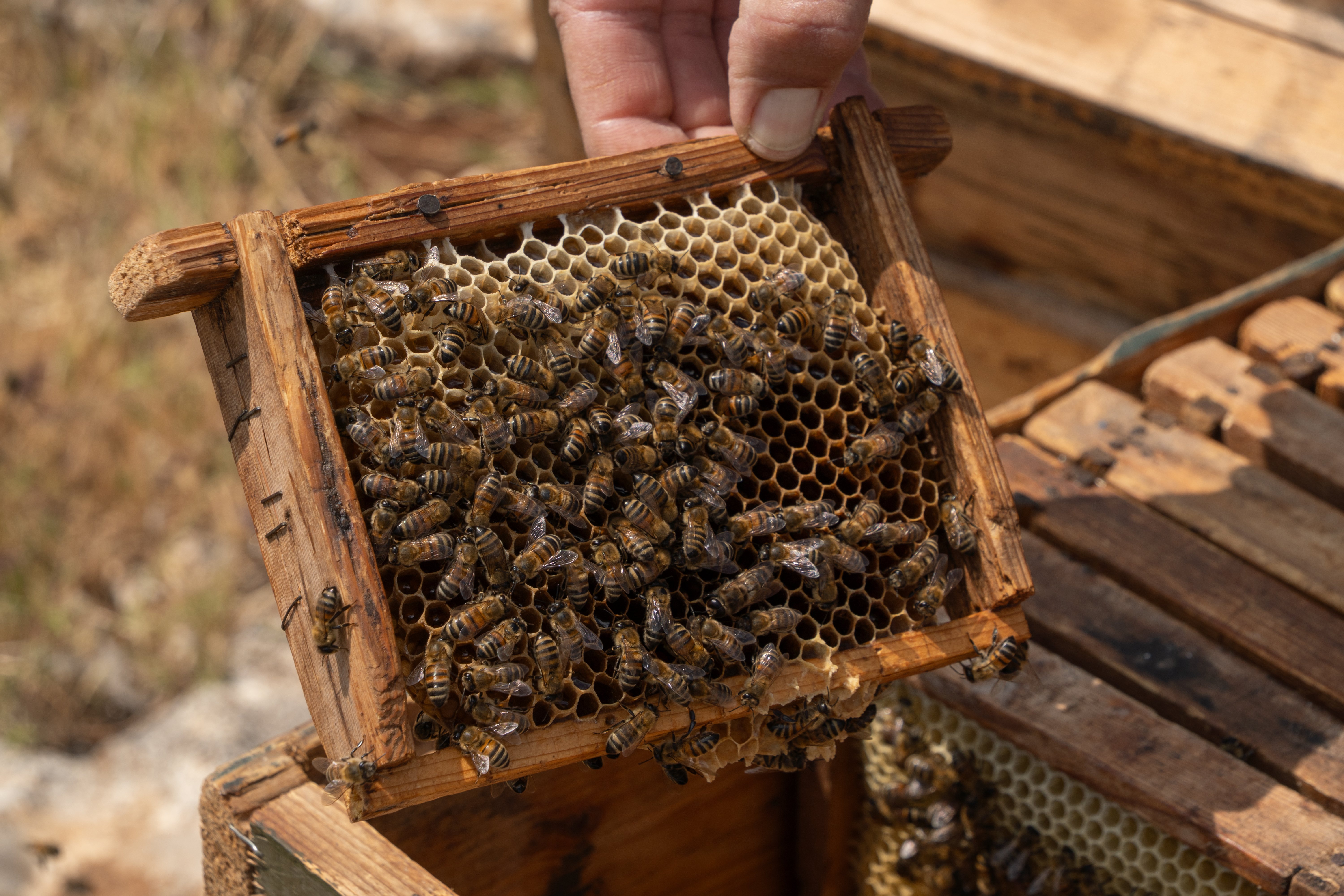 Ghraibi shows a frame from his box holding hundreds of bees April 29, 2025. (Anagha Subhash Nair/Raseef22)
Ghraibi shows a frame from his box holding hundreds of bees April 29, 2025. (Anagha Subhash Nair/Raseef22)
Ghraibi shows a frame from his box holding hundreds of bees April 29, 2025. (Anagha Subhash Nair/Raseef22)
“Bees are a part of me. I love them, I go watch them everyday, while drinking my glass of mate,” said Ghraibi, who sees beekeeping as an activity transcending just a way to make a living. “I like to hear them hum.”
He admitted that supporting beekeepers was not the highest priority for the government, now finding its feet after 14 years of civil war that battered the country’s economy. He hopes to increase the number of his hives from 10 to 200, and then teach the trade to his children and grandchildren to protect the practice.
Bees, especially queens, had to be reared in special centers so that they could breed and be distributed to beekeepers, letting them stay in the profession. In Ghraibi's eyes, bees are an insect that are close to God.
Mostafa too is determined to re-embrace his profession. “I left the boxes so that I can get more bees now that the war is over,” he said, smiling as he referenced the “spiritual connection” between a beekeeper and his bees.
“He loves his bees more than he loves me,” quipped his wife, Rafeef.
Raseef22 is a not for profit entity. Our focus is on quality journalism. Every contribution to the NasRaseef membership goes directly towards journalism production. We stand independent, not accepting corporate sponsorships, sponsored content or political funding.
Support our mission to keep Raseef22 available to all readers by clicking here!
Interested in writing with us? Check our pitch process here!
